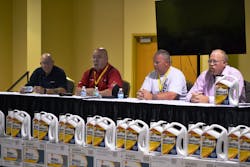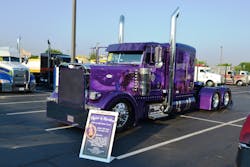JOPLIN, MO. For an industry desperate for fresh talent, what better way to attract drivers and technicians than to introduce recruits to trucking by showing off the best and brightest rigs—and the successful people who build and operate them?
That’s what the folks at FASTPORT, trucking’s military recruiting program, had in mind when they invited servicemen looking to transition into civilian careers for a day at the Shell Rotella SuperRigs show here.
Along with a session on transition planning, a demonstration of an engine teardown inspection, and a look at the dozens of trucks on display, soldiers from nearby military facilities got to hear from veterans who have gone on to successful careers in trucking.
Dave Harrison is J.B. Hunt Transport’s military program manager. The company is about half way to a goal of hiring 10,000 veterans by 2020. He’s a three-tour combat vet of the U.S. Army who, after his service, bought a share of a truck—and soon wondered if he’d made a huge mistake.
“But after about six months of actually learning my craft, I figured out that there was a viable future in this industry,” Harrison told the soldiers. He went on to join J.B. Hunt as an owner-operator.
Company founder J.B. Hunt was also a veteran, Harrison noted, and “he believed in the skill set the military provides.” Even before the push to hire more, veterans made up 18% of the company’s employees—compared to about 1% of the general population.
“We will go out the way to do just about anything for them,” Harrison said. “The concept that someone is willing to sacrifice their life for somebody they never met, so that their children or grandchildren might enjoy the freedom that hasn’t been known anywhere else in the history of the world, is an amazing thing and it should be honored.”
But then Harrison got “pragmatic,” explaining that businesses make decisions based on profit.
“Some businesses out there are hiring veterans because it’s cool, it’s what everybody’s doing,” he continued. “But Fortune 500 companies do a lot of research, and what we know is that veterans—once they enter the workforce and you keep them for over six months—those are going to be some of the best employees you’ve got. Universally. We’ve got a lot of data. It is good business.”
And it works because veterans understand logistics. After all, Harrison pointed out, the U.S. military literally moves and maintains “entire cities”—often “in places where they don’t want you.”
“It’s a pretty complicated process that guys in uniform do on a daily basis,” Harrison said. “And in the civilian world, logistics is what we do. It’s got a lot of moving parts: Moving something from A to B safely and in a professional manner, and to do that in a timely and efficient way. And there’s no better place to find the people to do that than in people coming out of the military.”
Jon Osburn went to Viet Nam at 17 as a Navy combat medic, and had a long career before an injury hospitalized him for nearly a year. He ended up driving trucks and now has 28 years on the road.
He made the move to trucking—even though his training was in medicine, and most of his family worked in the medical field—because of a “gypsy uncle” who worked for Mayflower. He quickly earned Elite Fleet Driver status and was the 1995 Driver of the Year. He attributes that success to his focus on service, and exceeding customer expectations.
“There is quite a career for people who want to use their military background,” said Osburn, who now drives the “Spirit of the American Trucker” OOIDA tour rig and was named a TA/Petro 2016 Citizen Driver of the Year. “What you have to offer the trucking industry is, you are a whole, big pile of skills in an industry that really needs professionalism and skills.”
Osburn impressed the soldiers with trucking’s technological sophistication as he explained his time as a “crash test dummy” in the development of refrigeration telemetry—for NASA, no less. He also emphasized the wide variety of driving jobs, and that opportunities can found whether one prefers to work local or long haul.
“After so many years being out at sea in the Navy, over-the-road driving fit in well for me,” he said. “Some fleets have banker’s hours—that’s what six in the morning to four in the afternoon is to me. But sometimes, the load has to get there when it has to get there.”
Howard Hill, who manages the truck test fleets for Shell, was a heavy equipment mechanic for the Marine Corps.
“God had a special plan in place. I came out of the Marine Corps, bought a box of SnapOn tools, and went to work with Shell in 1978,” Hill said. “I’m living every kid’s dream: I’m 61 years old but I still get to play with engines every day. I love engines, I love my job, I love everything I do. It’s technically challenging at all times. If you’re not keeping up with technology in this business, it will run you over.”
And, because of the demands, the opportunities for a veteran with technical skills are many.
“There is not a fleet in the country that is not screaming for qualified technicians,” he said. “Anybody can plug in a scanning tool and check a fault code on a truck. But can you follow up the maintenance tree, replace the right part and get it turned around and back out on the road? If the truck’s not rolling it’s not making money. You can make good money with decent benefits.”
Purple Heart recipient Sean McEndree drove trucks for the Army in Iraq, and was nearly killed when he saw and IED and used his truck to “take the blast” to protect a gun patrol that was on foot.
He’s used his time on the road to reconnect with “battle buddies,” and he’s become known for his tribute trucks. His second, the Purple Heart-themed “Band of Brothers,” took the People’s Choice award at the Paul K. Young Truck Beauty Championship at MATS this spring.
“Driving a truck in the military was a perfect fit for me,” McEndree says. “Little did I realize that becoming a truck driver would be healing process. It’s been a true blessing.”
But the panel cautioned the soldiers, who are accustomed to taking charge, to have “realistic expectations” when they enter the civilian workforce.
“You’re going to be frustrated in your first six months, because a lot of HR folks don’t know how to utilize those skill sets all the time. But a lot of it has to do with the service members themselves," J.B. Hunt's Harrison said. "It’s a different world. Veterans see things they could fix easily, and they’re not allowed to. It’s a tactical environment; you’ve got to wait for your opportunities. Be patient.”
Indeed, research shows that veterans “will separate themselves from the pack,” he continued. And in trucking, people who “stay focused” will thrive.
“There’s not one person who’s getting a college degree this year that’s going to have 30 different companies calling on them about work,” Harrison said. “A professional truck driver or a mechanic that’s good is going to get that on a regular basis. Trust me, if you’re a good truck driver or a mechanic, your career is set.”
About the Author
Kevin Jones 1
Editor
Kevin has served as editor-in-chief of Trailer/Body Builders magazine since 2017—just the third editor in the magazine’s 60 years. He is also editorial director for Endeavor Business Media’s Commercial Vehicle group, which includes FleetOwner, Bulk Transporter, Refrigerated Transporter, American Trucker, and Fleet Maintenance magazines and websites.


